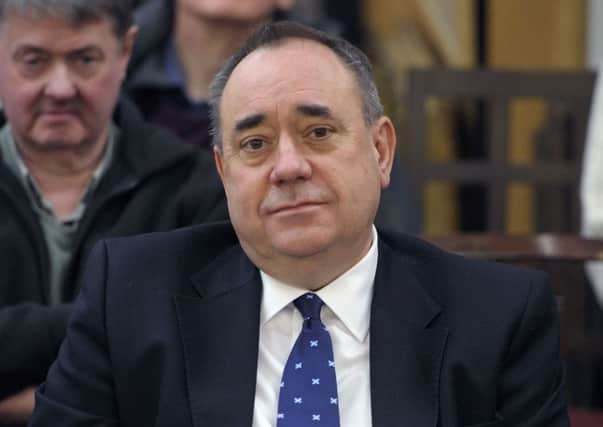Leader: Alex Salmond’s smart move


While it sounds like a statement of principle, his qualification that the ban would only be dropped to support a Labour government and that the SNP would have no dealings with the Conservatives indicates this is primarily a tactical positioning move, and a clever one.
It serves the Nationalist cause in three ways. Firstly, current opinion polls show the SNP, for the first time in the history of Scottish polling, consistently well ahead of Labour and likely to win a large number of hitherto safe Labour seats. The SNP’s historic problem in these elections has always been that it cannot form a UK government and therefore gets marginalised.
Advertisement
Hide AdAdvertisement
Hide AdBut this time, as opinion polling also suggests that both the Conservative and Labour parties are struggling to win an overall majority, the SNP can argue that Scots can vote SNP and get a Labour government because the SNP would support it.
Secondly, Mr Salmond says he would seek, in coming to an arrangement with Labour, to negotiate a better constitutional deal for Scotland. Thus Scots, by voting SNP, would not just help avert a Tory government but would secure more powers for the Scottish Parliament and put the SNP further down the road towards the goal of independence.
Thirdly, Mr Salmond must surely know this plan can only come into play if Labour is the largest party but does not have an overall majority and would certainly not have a majority of English seats. But the likelihood of the English electorate meekly accepting it should be ruled by a Labour Party that had failed to win in England and was supported by Scottish Nationalists is so remote as to be impossible.
CONNECT WITH THE SCOTSMAN
• Subscribe to our daily newsletter (requires registration) and get the latest news, sport and business headlines delivered to your inbox every morning
If there was such an arrangement, it could well result in the destruction of Labour as a major political party.
Such a result would serve the SNP, as it would be positioned to become the dominant Scottish political force, so dominant, indeed, that independence would not be far away.
No doubt Ukip and the LibDems will also look soon at this positioning game, and the major parties will be considering what deals can be done. It is unlikely any of them will write their hung parliament strategy in any manifesto, but it would serve voters better if they knew what the various parties’ strategies were before they cast their vote.
Hung parliaments can be dangerous affairs, creating uncertainties which cause economic damage and cost jobs. At least the SNP has set out its stall; others need to do the same. Otherwise, we hope that the economic recovery is strong enough to withstand any turmoil which the politicians inflict on us with their after-election deals.
Jury is out on court video move
Advertisement
Hide AdAdvertisement
Hide AdCould witnesses to a criminal incident record their evidence in a video statement that could be played at a subsequent trial in front of a jury? This possibility is said to be being explored by the judiciary and the courts service. The aim is to cut out the wasting of witness time when trials are called but then get postponed, a frequent occurrence that can happen several times as a case progresses through the system.
Because of this problem, which also costs public money, the idea initially seems attractive. The statement, instead of being written down by a police officer, could be recorded while the details of an incident were still fresh in a witness’s mind.
Police transcriptions are often challenged by defence lawyers trying to undermine the prosecution’s case and put doubt in a jury’s mind.
However, while a video may seem to be not so challengeable, it could be in other ways. In court proceedings, lawyers are not allowed to ask leading questions that suggest the answer the lawyer wants a jury to hear. But while written statements do not normally contain the questions asked by police, a video statement would, and those questions could well be leading ones. How would that be dealt with?
A video statement could be useful in summary proceedings before a sheriff, but there is still the problem of cross-examination which looms even larger in more serious cases before a jury. It is an essential part of any fair trial that an accused person or their lawyer be able to ask questions of a witness to extract details that may reveal the accused’s innocence.
This is an idea that needs some very careful thought.
SCOTSMAN TABLET AND IPHONE APPS